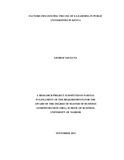| dc.description.abstract | E-learning generally refers to the methods of learning which use electronic instructional
content delivered via the internet and is a term which is synonymous with Web-based or
online learning. In this age of globalization knowledge acquisition has become the critical
means for gaining competitive advantage, and as such learning has become a crucial
element of knowledge acquisition, application and creation. The objective of this study
was to determine the factors influencing the use of e-learning in Public Universities in
Kenya.
E-learning seems unsuitable for those individuals without self-discipline. It requires a lot
of self-discipline, mostly because e-learners are busy working adults as explained earlier.
Besides, e-learners also seemed to need preparatory training especially in ICT skills in
order for them to get used to e-learning environment. On top of these problems, elearners
also face some problems for instance necessity of computer resources, bandwidth
problems, lacking physical interactions and limited recognition of e-learning courses etc.
These facts show that e-learning is not perfect at the moment and the e-learning providers
should consider these limitations to improve e-learning services.
A descriptive survey design was used in finding out the factors influencing the use of elearning
in Public universities in Kenya. The Population of this study was the 19,205
employees (Academic and non-Academic staff) in all public universities. The sample size
was 96 employees. A questionnaire was the preferred data collection instrument for this
study. Descriptive and inferential statistics were used to analyze the data.
Results revealed perceived usefulness was important in explaining the use of e-learning.
This is supported by a p value 0.000 which means that perceived usefulness is a
statistically significant predictor of the use of e-learning. Results further revealed that
such perceived ease of use is important in determining use of e-learning as demonstrated
by a p value of 0.000. Analysis showed that supporting infrastructure is a key determinant
in use of e-learning in Universities in Kenya and this was supported by a correlation
coefficient of 0.398. | en |

